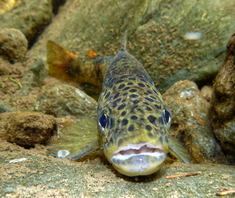15-point plan aims to save biodiversity in freshwaters
Biodiversity in inland waters is in crisis. "Below the water's surface, hidden in plain sight, biodiversity in freshwater ecosystems is dwindling at an unprecedented rate, both regionally and globally," explains Astrid Schmidt-Kloiber from the Institute of Hydrobiology and Aquatic Ecosystem Management at the University of Natural Resources and Life Sciences, Vienna. The researcher is part of a 95-strong team from around the world that created an agenda to prioritize research topics and protect freshwater biodiversity. The project was initiated by German biodiversity researcher Sonja Jähnig and her team. Together, the researchers developed 15 priorities in the areas of data infrastructure, monitoring, ecology, management and socioecology. "There are currently gaps in all 15 of these, and we want to identify them and thereby steer both research and research funding in that direction," Schmidt-Kloiber said.
Data needs to be digitized
The biodiversity researcher's focus is on data infrastructure. Currently, she said, data on freshwater biodiversity is often very scattered and patchy. In addition, data management is often nationally or even regionally regulated. In order to make sound statements, data would have to be mobilized across Europe and globally. "Without digitization of old data, long-term developments can be poorly assessed and thus conclusions such as those about climate change can hardly be drawn," Schmidt-Kloiber explains. In addition to knowledge gaps, the researchers identified two other major challenges: Communication difficulties between researchers, decision-makers and implementers, and the lack of political implementation.
Freshwater far behind marine and terrestrial areas
WWF's latest Living Planet Report shows an average decline of 84 percent over 50 years, in 3,741 populations studied, representing 944 freshwater vertebrate species. This is the steepest decline in the three major areas - terrestrial, marine and freshwater.
Despite these numbers, decision-makers continue to fail to give biodiversity in inland waters the priority it needs. For example, a recent report on environmental funding from 127 European foundations shows: Only 1.75 percent of the total 745 million euros approved for environmental work in 2018 went to inland waters. This places them second to last among the 13 thematic categories used to evaluate funding. Often, inland waters are included with terrestrial ecosystems and then not adequately addressed in funding plans. For example, they also do not appear as a separate item in the United Nations' 17 Sustainable Development Goals (SDGs), but are listed under SDG 15: "Life on Land."
Biodiversity also valuable for people
In Austria, the biodiversity crisis was recently reflected in the Biodiversity Barometer, which the Biodiversity Council published for the second time. There is no praise for politics. The 20 members of the Council rated twelve of the 19 points as red, six as yellow and only one as green.
Through the 15 points of the agenda, the international research community now wants to set an impulse. Targeted research on the conservation and protection of freshwater biodiversity is to be advanced. To this end, the Institute of Hydrobiology and Aquatic Ecosystem Management at BOKU Vienna is already participating in the MERLIN project, which pursues a similar goal by advancing the restoration of aquatic ecosystems. "After all, certain ecosystem services, such as the self-purification of rivers, which are also of great importance for human well-being, only function when all links in the chain are intact," explains Schmidt-Kloiber. Loss of diversity - genes, species, populations, communities or entire ecosystems - also results in the loss of important ecosystem services. "Moreover, every living being has a right to live and be protected," the researcher is convinced.
The study has just been published in the journal Ecology Letters:
https://doi.org/10.1111/ele.13931
Another summary of the study can be found on the Freshwater Blog:
https://freshwaterblog.net/
Contact
DI Dr. Astrid Schmidt-Kloiber
University of Natural Resources and Life Sciences, Vienna
Institute of Hydrobiology and Aquatic Ecosystem Management
E-Mail: ask(at)boku.ac.at
Tel.: +43 1 47654-81225

